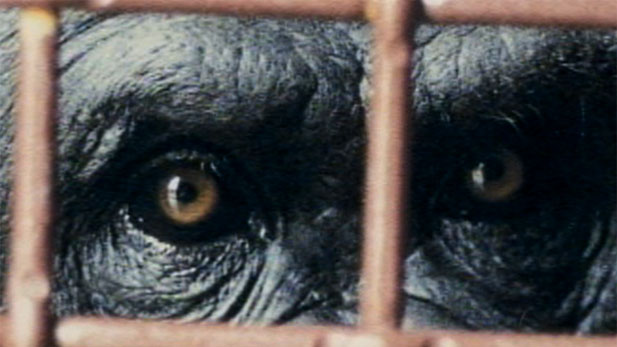The most disgusting part of this experiment is when Nim is taken away from his first human home, the woman assigned to his role as mother describes how difficult it is for her to know he is being taken away from her. It seemed as if this woman had no empathy toward the mother chimp when she took away her baby, but when Nim is going to be taken away from her it is devastating. How on earth is it not possible for this woman to realize what she had done to the mother chimp?
Being an animal lover, I have of course thought about how amazing it would be to have a chimp or any other animal live with me, but because I love animals I know that despite my feelings it would be detrimental to the animal. It would be a once in a life time experience to have a chimp wrap itself around me but at what cost? First of all, chimpanzees are first and foremost wild animals, they belong in the wild because they are so much stronger than us and have animal instincts to attack. There is no experiment in the world that makes using an animal for human gain right, when it means taking them from their home environment. For this reason I have a love hate relationship with zoos. The only reason I believe zoos are okay is because they help endangered animals and work for conservation. This experiment is nothing like what zoos do. When these scientists were "done" with Nim they took him back to the institute he came from. They talked about how they hoped Nim would not feel any pain or abandonment but in actuality it was more the humans working with him that would feel abandoned. I say this because when Nim was taken out of his first human home and moved to another, Nim felt no abandonment and loss of his past home. It turns out his feelings of abandonment only come when he is completely alone and isolated.
This chimp institute in Oklahoma, Lemsip, scared Nim immediately. He had never seen any other chimps and not only were their other chimps, these chimps were locked away in primitive cages. Taking Nim away from a house and basically a life of a human child to put him in a cage with a lock around his neck is utterly inhumane. What these scientists did to Nim is unspeakable. To take this poor chimp from his mother, introduce him and raise him as a human child, only to bring him to this inhuman cage is reprehensible. The tragedy of this thoughtless experiment is summed up by one of the scientists, "We made a commitment to him and we failed. We did a disservice to that soul and shame on us." I could not have put it any better, shame on them. I cannot stand when people take an animal into their home only to abandon the animal years later after they grow attached to not only the human but the environment. To leave a social animal such as a chimp alone in a cage is torturous. Chimpanzees and all other social animals need companions.
I work at a veterinary clinic and it hurts every time their is an orphaned or abused animal in the clinic. Both of my German Shepherds were rescues. It took so long for my first dog, CJ to trust us. Even as he grew older he would not eat if we left him in the house, because he was afraid we would not come back. Because I was so young when he got CJ I didn't really understand how he felt and roots of his actions but when we rescued Saba after CJ died I knew exactly what was going on. It took months for Saba to become comfortable in our house to the point that she could be herself. And to this day she continues to give us a sad face, a face that illustrates her loneliness, and barks whenever we leave the house- afraid we will not come back. As much as it pains humans to do what might be best for an animal it must be done. It is just like when a pet is sick- despite the pain the family will feel it is humane to put the animal to sleep so they do not feel any more pain. This is exactly what happened with CJ. We by no means wanted to lose CJ, we did not want to put him down, but because he had bone cancer and was in immense pain, we needed to think about him not ourselves.
Scientific experiments and animal testing hurts countless animals every year. There has to be another way to test vaccines than on animals. It is now the 21st century, there has to be another way. In my mind taking an animal life is not worth saving human lives. Just because we have reason and can speak, does not mean that we are more valuable then any animal. There is a reason greed is one of the seven deadly sins. What scientists have done to not only Nim but to countless other animals is unforgivable and heartbreaking.

"In what terms should we think of these beings, nonhuman yet possessing so very many human-like characteristics? How should we treat them? Surely, we should treat them with the same considerations and kindness as we show to other humans; and as we recognize human rights, so too should we recognize the rights of great apes? Yes." - Jane Goodall
'The more we learn of the true nature of non-human animals, especially those with complex brains and corresponding complex social behavior, the more ethical concerns are raised regarding their use in the service of man-- whether this be in entertainment, as 'pets,' for food, in research laboratories, or any of the other uses to which we subject them." Jane Goodall
No comments:
Post a Comment